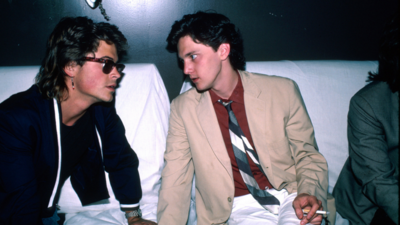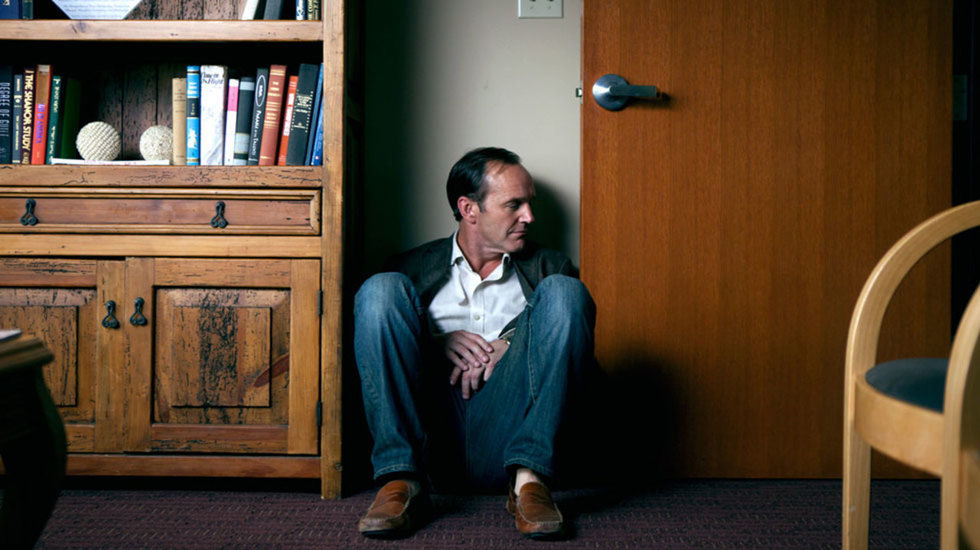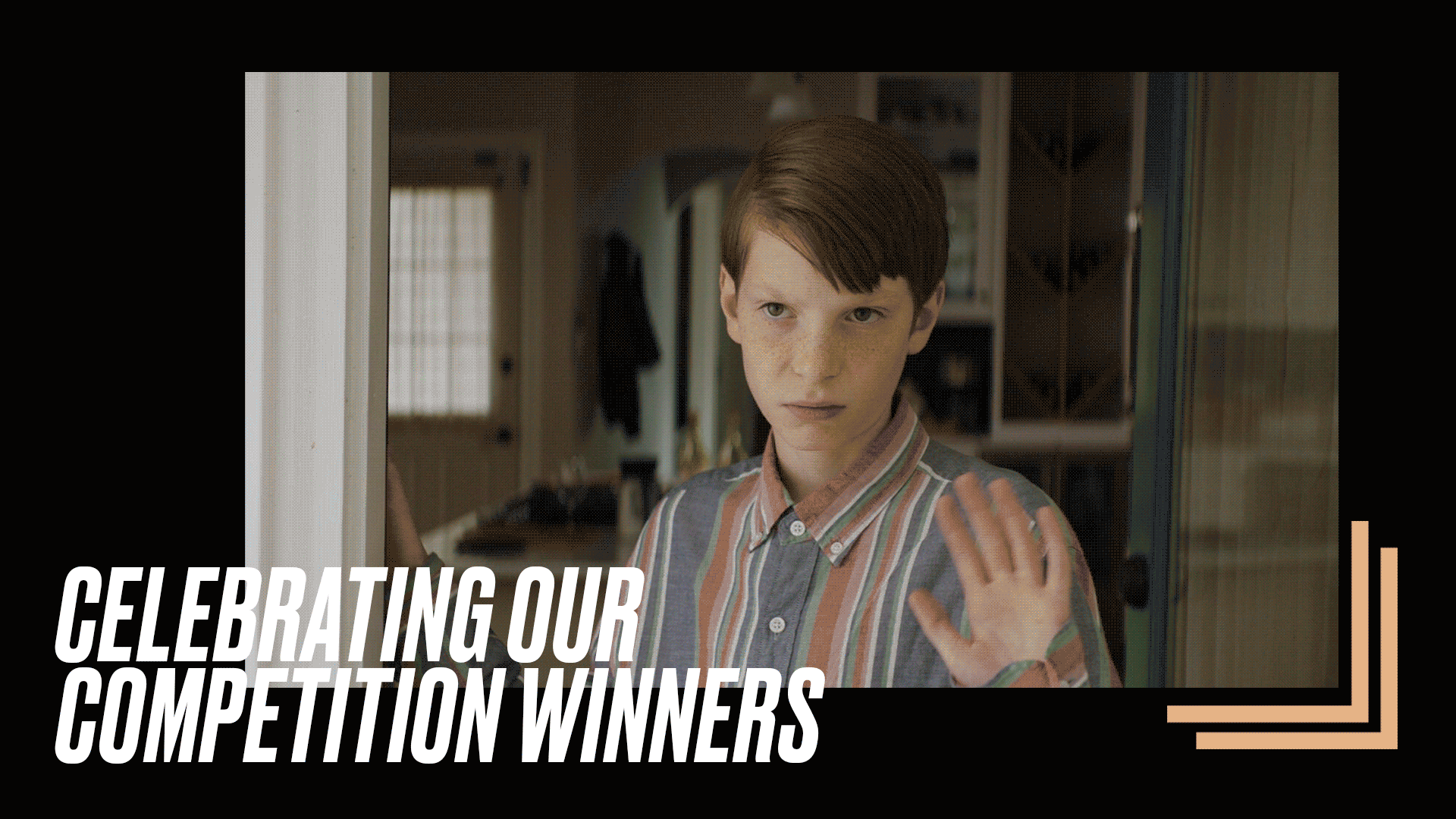
BY KAREN KEMMERLE |
‘Trust Me’ Filmmaker Clark Gregg on Blending Genres and Striking the Right Tone
Starring Sam Rockwell, Amanda Peet, Felicity Huffman, and newcomer Saxon Sharbino, 'Trust Me' is directed by the versatile Clark Gregg who talks about writing, directing, producing and starring in his sophomore feature.

 Tribeca: Trust Me just celebrated its world premiere at TFF 2013. Have you had time to process yet?
Tribeca: Trust Me just celebrated its world premiere at TFF 2013. Have you had time to process yet?
Clark Gregg: It was an amazing experience, an out of body experience for me. It was a movie that really kind of came to me from my own consciousness, not something I expected it would be. We finished it about a week or so before the festival and I had never seen it in front of a real audience.
I was so nervous, especially because I was in that giant theater last year for the Closing Night screening of The Avengers. I couldn’t believe my tiny indie film made on a shoestring was playing at the same venue. It wasa really remarkable just to sit there with that really smart, wonderfully supportive New York audience that really got the movie and kept with it, which was really moving to me. It was a really special night I won’t forget.
Tribeca: Your central character, Howard, is a man who has been jaded by Hollywood in the past (and in the present), but never loses his love for the industry. Would you say that describes your own outlook?
CG: Yes, I’ve certainly felt like that plenty of times, probably more than half of my life. I’ve been struggling to find a place for myself and to make a living. Plus, there’s a certain amount of rejection you have to deal with that a lot of people, thankfully, don’t ever have to experience. It’s brutal. I have to say, I’m much happier with the success I’ve had later in life than when I first started out. However, I’m connected with and care about a lot of other actors who haven’t been treated the same way that I have, but still have the same passionate love for the work and for films, despite their mistreatment.
Tribeca: You have so many interesting projects occurring simultaneously. You are a part of one of the leading movie franchises and soon you have the challenge of moving that franchise to another medium, television. I can’t imagine where you found the time to write and make Trust Me. From conception to print, how long did it take?
CG: It took a while. I wrote the first draft as I was finishing up a sitcom called “The New Adventures of Old Christine.” That must’ve been four years ago. I guess it was not that long after my first film, Choke,was released. Sometimes I had to postpone trying to make this movie because of Marvel projects that came up.
Plus, it also took that long because I had to find the financing to make it. We wanted more money, we needed more money, and we couldn’t find it, and eventually we went ahead and made it for substantially less than we had intended and embraced those challenges. I didn't want to wait for forty years to make another film. It’s a hard time for independent film.
Titles are the hardest thing to come up with.
Tribeca: There’s an interesting blend between the reality of Howard’s life and his fantasy world, which I thought you kept in a beautiful suspension. How did you strike that delicate balance?
CG: When I was writing the movie and got to the end, I had this idea of what I thought the ending should be, and then I had this other ending come to my mind that had an element to it that was much more Howard’s imagination from the movie within the movie. I didn’t know where it came from, but a lot of the time when inspiration strikes me, the next day I tend to doubt myself and feel relief that no one else saw that but me.
But this one…I don’t know…it felt like the other kind, where it felt like this is the movie that I want to make. So I reverse-engineered the barrier between Howard’s imagination and his reality, so that when that came at the end, the table had been set for it.
Tribeca: Trust Me blends together a number of genres: comedy, drama, romance and even mystery. Did you ever fight the inclination to keep things “simple”?
CG: I knew that because of the shift my script takes, this was a very risky endeavor. It starts out as one film then gradually shifts, but that felt very true to the nature of the story and the nature of the world I was trying to portray. A lot of what I spent time doing, during the writing process, production and in post, was trying to make sure there was enough DNA within the drama to make the shift feel integrated.
I knew I was trying something unusual, but I don’t see the point in making an independent film if you're going to be safe. I had to hire actors that could play that tone and make sure that the comedy wasn’t so broad that the shift would not be believable. It had to be real throughout. I had to really surround myself with everyone, from a composer who could put that tone into the early scenes that were funny but with a haunting feeling that really started to prepare the audience, to a cinematographer and an editor who also saw the thing as a whole.

Tribeca: Trust Me is, of course, full of amazing actors like Sam Rockwell, Amanda Peet, Alison Janney, Molly Shannon and more. However, the real stand-out is Saxon Sharbino as Lydia. Can you talk about how you found her? Was she always your first choice for the role?
CG: At first, I went for some kind of well-known young actresses, and their parents proved to be very wary about the subject matter. I ended up going out on a search. My producer is someone who also works as a casting director, Mary Purdue, and she knew about Saxon. I think I’d already seen dozens of people when I was Saxon. Pretty much as soon as she walked in, I realized that there was something different happening with me as Howard meeting this girl. She didn’t have a lot of experience, she didn’t feel actress-y, she felt very, very real. There was no second choice; it was Saxon.
Tribeca: When I first starting watched watching this movie, I thought it was going to be like Swimming with Sharks, but not psychotic. However, your film is transformed into something much more. What movies inspired you?
CG: I started out writing what I thought would be an edgy comedy. I didn’t have any interest in writing anything about show business, but there was something about the emotional nature of this guy’s world, and what he had been through, and the way he was circling the scene of the crime where he’d been so traumatized, trying to get healed. That really was compelling to me.
As I started working on it, the things it kept making me think about were that classic Sunset Boulevard, neo-noirs like Kiss Kiss, Bang Bang and Chinatown. It felt like that world for me, yet it felt like there was a magical component, an imaginative thing that I didn’t feel like I’d seen done this way before. That’s what was most exciting about it for me. I didn’t feel like it completely fit into anything I’d ever seen before, and from my perspective, there are those sorts of movies that really take a dark turn, but I feel like this takes more of a complex turn into something that’s kind of dark but also very hopeful and magical.
I don’t see the point in making an independent film if you're going to be safe.
Tribeca: Amanda Peet said something interesting. She observed that your scenes with her are so light that there is something very Preston Surges or Ernest Lubitsch in your romantic banter. My favorite line of the movie is ‘Oh you didn’t know, but I’ve been stalking you from afar.’ Did you look to those sorts of movies?
CG: I love movies like The Big Sleep that just have crackling dialogue. I love that and I feel like Amanda’s so incredible in the film that while there’s kind of a romantic comedy element to our scenes, we are not young people. It feels like we are two people who’ve really been romantically beaten up and tentatively decide they can trust each other, and I guess that’s kind of what interested me about it. There were some parts that I found really funny, but all of them had a kind of sadness underneath them.
Tribeca: In addition to producing, youserved triple duty on this film—actor/director/writer. Which of these roles proved to be the most challenging and why?
CG: In a way, the acting of it was physically more difficult than anything I can remember trying to do, because I was doing these other jobs. Plus, I had to expend a great amount of energy to prepare and just keep up with the rest of the cast. I would have to drive back to the hotel four blocks away because I was just so tired, I couldn’t walk back.
In the long run, making the movie work in post and finding a way to get the visual effects done were tough as well. However, making the movie work as a director/producer as well proved to be the most challenging part in the long run.
Tribeca: I think Trust Me is a really great title for the film. Did it just occur to you or was there a particular source of inspiration?
CG: There were some titles that I thought of, but they were titles that I didn’t love or that gave away the ending. They were really just bad, to be honest. Titles are the hardest thing to come up with. I did have titles that referred to Lydia’s story, but I think that, even though their journeys are so mirrored and connected, the film feels like Howard’s story.
Tribeca: Trust Me is one of our Back-By-Popular Demand movies, which merits an extra showing on the last day of the Festival. What makes Trust Me a must-see?
CG: I don’t think you’ll see—and I’m going to exclude myself from this—I don’t think you’ll see a better cast of actors. I think the people that I was lucky enough to hire give a more seamless ensemble performance with humor and depth than you will see in any other film at the festival. [laughs] However, I can only say that because I haven’t seen any other films.
Trust Me plays one final time this Sunday night at the AMC Loews Village. For more information, visit our film guide.

